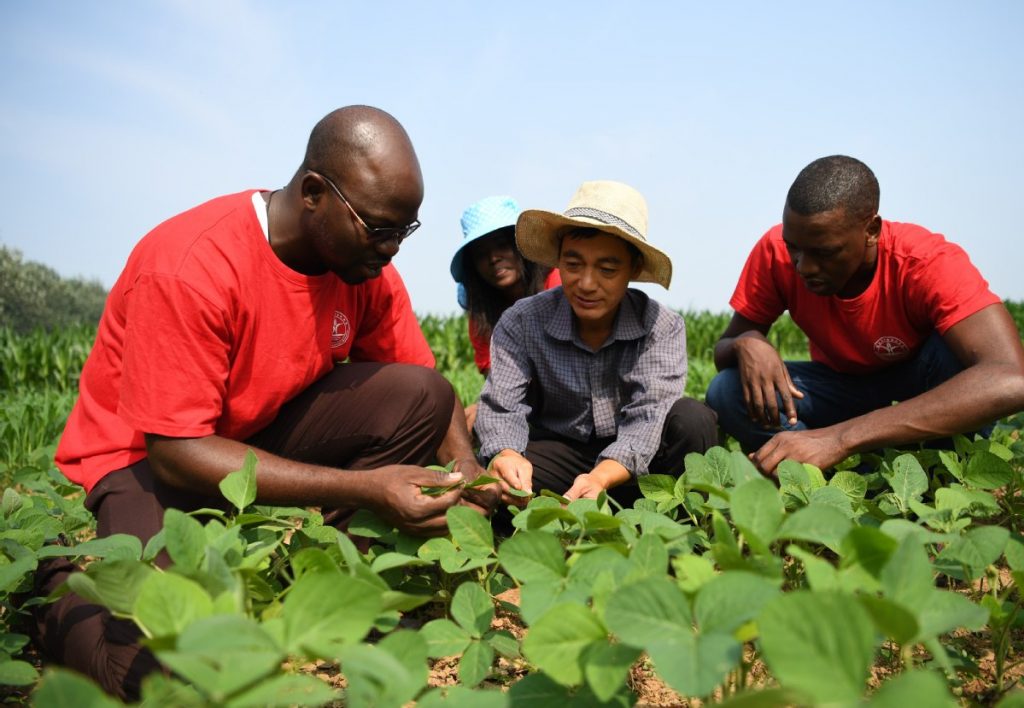
By LIU HONGJIE and OTIATO OPALI
Firm direction has been vital in China’s efforts to raise living standards, providing inspiration for Africans in growth quest, Kenyan politician says
Editor’s note: As China aims to eliminate extreme poverty and be a “moderately prosperous society” (xiaokang shehui) in time for the 100th anniversary of the founding of the Communist Party of China next year, we talk to experts for their take on the country’s commitment.
Raphael Tuju, secretary-general of the ruling Jubilee Party in Kenya and a cabinet secretary without portfolio, has said China’s growth over the past few decades has been too rapid for the West to grasp.
Speaking in Nairobi, Tuju congratulated the people of China for having lifted more than 850 million people from poverty in only about 40 years.
“I still remember back then when we were in school, the image of China in our heads was that of a Chinese farmer in a straw hat in a rice field, but fast forward to today and China just recently launched its first independent mission to Mars,” he said.
“If you look at that contrast you will understand why no one would have imagined China would be where it is today.”
The Chinese miracle has happened so suddenly that the West has not come to terms with it, he said.
“The images that we have from China 20 years ago or 30 years ago are completely different with what China is today,” he said.
“The fact that most people in the West have not absorbed the extent of China’s development in recent years and have not had a chance to visit the big and modern metropolises like Beijing, Shanghai, Guangzhou or Shenzhen still makes them think that probably London, New York or Paris are way ahead, because that is how people’s thinking in the West has been shaped for several generations. So it will take them a while to understand what a great development China has achieved.”
Western mentality
“This mentality by the West had been cultivated globally, and I still remember when I was Kenya’s foreign affairs minister, it was difficult for me to convince my colleagues in government that we should look East and cultivate stronger ties with China. This was because most of my contemporaries in government had studied in the United States or Europe or the Western countries in general. They had very little knowledge of China, so they would never expect that great things could come from China.”
Tuju said a major advantage for the Chinese people that has enabled them to lift millions out of poverty is their system of governance, which is different to that in the West and adopted by most African countries on independence.
“President Xi Jinping did not become the president of China and the general secretary of the Communist Party of China Central Committee because of his wealth, but because he had gone through a rigorous process and rank system within the Party, where positions are earned on merit,” he said.
The leadership and political system are very important, Tuju said, because the rise and fall of a country is related to its leadership and political system.
“With the right leadership in Africa we should be able to make the transition from being a backward agrarian society to become a more industrialized economy.”
Xi’s philosophy of helping people out of poverty contributed a lot to the great achievement of China’s poverty elimination and building a moderately prosperous, or xiaokang, society, he said.
“There is a saying that if you are poor, that’s very bad, but you can still lift yourself to get out of poverty, just like the way China has done. Whereas, if the poverty is in your mentality, that is very difficult to remove. For example, if you think it is very comfortable living in a slum you will never get out of the slum; if the slum is not in you, there is opportunity to get out of it.”
Xi Jinping Thought on Socialism with Chinese Characteristics for a New Era has enlightened the Chinese people, and African countries admire Xi’s resolve and see him as one of the greatest modern leaders of China, whose philosophy will be a subject of studies for many more years to come, Tuju said.
Tuju, born in 1959, started his career as a TV news presenter in the late 1980s and early 1990s. In 2002 he was elected as a member of parliament. He was minister of information and communications and minister for tourism and wildlife between 2003 and 2005. He then became foreign minister, a post he held until the end of 2007.
In 2017, Tuju became the secretary-general of the newly formed Jubilee Party, and the next year Kenyan President Uhuru Kenyatta named him as cabinet secretary without portfolio.
Willingness to learn
He has been to China many times, and in 2018 he said at a meeting that Kenya is keen to learn from the CPC not only to develop the party but also grow the economy.
The same year, to further understand the secret of China’s development, Tuju started to take Chinese classes twice a week. He can speak simple Chinese sentences now and has sent his good wishes to the Chinese people on several occasions in Chinese.
He expressed his willingness for his party to learn from the successful experience in governing the country.
“The Communist Party of China is the biggest political party in the world. Its grassroots organization is second to none. The Jubilee Party can only aspire, and where possible learn some lessons. It is unlikely that in our lifetime the Jubilee Party can get anywhere close to the organizational levels of the Communist Party of China. In any case the cultural contexts are very different. But once again what is wrong from learning from the most successful and the best run?”
The model that works in China can also work in other developing countries, including some African ones, especially those that have exhibited similar development strategies, he said.
China’s Belt and Road Initiative had a lot of common goals with Kenya’s Vision 2030, which aims to transform Kenya into a newly industrializing, middle-income country providing a high quality of life to all its citizens by 2030 in a clean and secure environment, Tuju said.
Another key factor that helped China grow to be the world’s second-largest economy and the world’s factory within just 30 years was universal literacy, numeracy and scientific knowledge, without which no country in history, including China, has transformed its economy and people.
Tuju praised China’s approach and system and its relevance to Africa today.
Kenya would like to deepen collaboration with China in all aspects and boost the development of bilateral ties and the relations between the CPC and his Jubilee Party, he said.
Agriculture is one area in which Tuju said more collaboration between China and Africa is necessary if Africa is to enjoy the kind of rapid growth China has had in the past few decades.
“You will notice that most of our agriculture is rain-fed and employs very little technology. In addition, many people look down on agriculture and associate it with peasantry and poverty. However, we cannot be food sufficient or a moderately prosperous society without modern agricultural practices.”
Tuju said he hoped China and Africa would collaborate more in technological advances and best practices when it comes to agriculture. Chinese investment in Africa’s agriculture in terms of technology will help lift agriculture on an industrial scale to increase capacity, he said.
Two major beacons
In a goodwill message, he said: “It is my singular honor to be able to express my good wishes for the wonderful people of China and the leadership of China led by President Xi Jinping, especially as you go toward marking two major beacons of your development, the first being the elimination of poverty. And second, being able to mark the time of when China becomes a moderately prosperous society of the world during the ceremony marking the 100 years of the CPC.”
In an interview with CGTN, Tuju commended China’s significant contribution to the global fight against COVID-19, saying China has stood with Africa during this time of crisis, adding that in the fight against the coronavirus, the world is relying on China.
The China-Africa friendship has been magnified by the quick response and massive resource mobilization for Africa after the first COVID-19 cases were reported in the continent by Egypt in February, Tuju said.
Medical supplies and personal protective equipment donated by China are of great significance to Africa’s fight against the pandemic, he said. On behalf of Kenya and its beneficiaries, he expressed gratitude to the Chinese government and people.
Tuju also complimented China for its success in containing the virus at home. Very few countries in the world had the capacity to shut down a whole city, as China had in Wuhan, he said. It is a reflection of a lot of courage on the part of the Chinese government, he told CGTN.
Raphael Tuju is secretary-general of Kenya’s ruling Jubilee Party and a cabinet secretary without portfolio.
China Daily
 Africa -China Review Africa -China Cooperation and Transformation
Africa -China Review Africa -China Cooperation and Transformation
